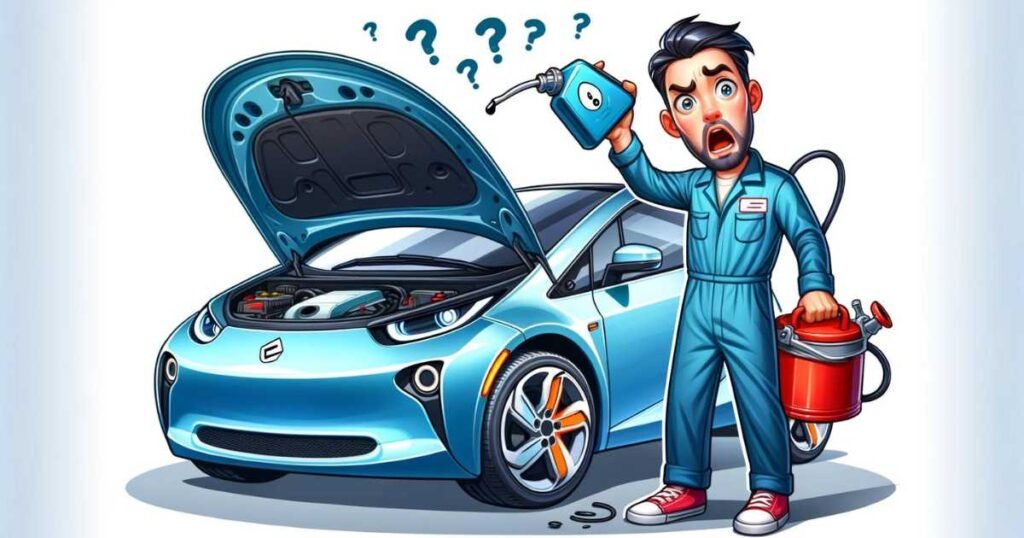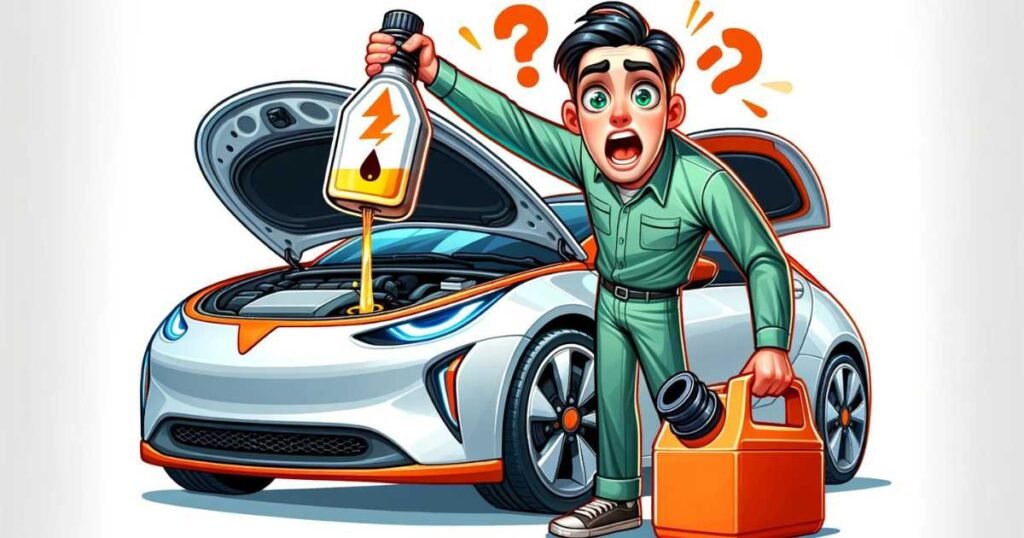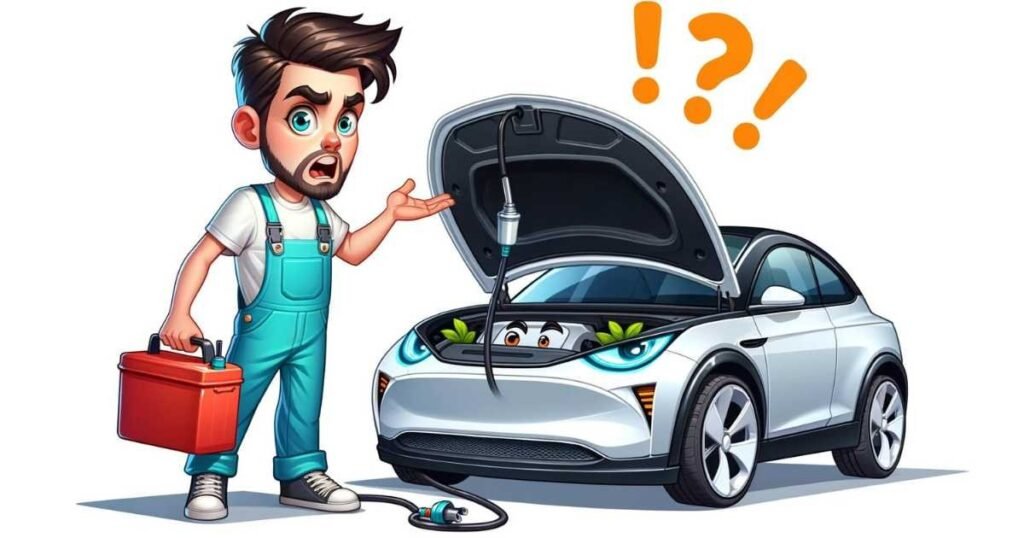For generations, oil changes have been an essential part of car ownership. But with the rise of electric vehicles (EVs), many drivers wonder: do these new-age machines still require the messy, time-consuming ritual of oil changes? The answer, in short, is no. But understanding the reasons behind this difference requires delving deeper into how EVs work.
Table of Contents
Do Electric Vehicles Need Oil Changes?
The answer is simple: electric cars don’t use engine oil. Traditional gasoline-powered vehicles rely on oil to lubricate the many moving parts within the engine. Electric cars, however, have no internal combustion engine. Instead, they use an electric motor powered by a battery. This motor has far fewer moving parts and requires no oil for lubrication.
So, you can kiss those oil change appointments goodbye! But that doesn’t mean EVs are entirely maintenance-free. Let’s explore some essential fluids and maintenance aspects to keep your EV running smoothly.

Why No Oil Changes for EVs?
The key difference lies in the engine. Traditional gasoline cars rely on internal combustion engines with numerous moving parts that require lubrication to prevent friction and wear. Engine oil acts as this lubricant, needing regular changes to maintain its effectiveness.
On the other hand, EVs boast electric motors with far fewer moving parts and similarly don’t require lubrication. Instead, they use electricity and magnets to generate power, resulting in a much cleaner and more efficient operation.
So, you can kiss those oil change appointments goodbye and enjoy the freedom of an EV ownership experience.
Why Traditional Cars Need Oil Changes?
In gasoline-powered cars, internal combustion engines (ICEs) rely on numerous moving parts like pistons, valves, and crankshafts. These parts generate friction as they spin, creating heat and wear. Engine oil acts as a lubricant, reducing friction and protecting these components, making regular oil changes essential for maintaining engine health and performance.
Do Electric Cars Require Zero Maintenance?
While you won’t be scheduling regular oil changes for your EV, it’s important to remember that no car is truly maintenance-free. Electric vehicles still require routine checks and maintenance of essential fluids and components, such as:
- Coolant: Just like in traditional cars, coolant plays a vital role in regulating the EV’s battery and motor temperature. Regular coolant level checks and occasional replacements are necessary.
- Brake fluid: As with any vehicle, safe and efficient braking relies on properly maintained brake fluid. Consult your owner’s manual for recommended inspection and replacement intervals.
- Gear reducer oil: The gear reducer, also known as the transmission in an EV, requires specific lubrication to function smoothly. In comparison, this oil only needs to change more often than traditional engine oil; periodic checks and replacements are essential.
- Windshield washer fluid: Keeping your windshield clean and clear for optimal visibility is crucial for safe driving. Regularly top up your windshield washer fluid reservoir.
- Transmission fluid: Though EVs don’t have traditional transmissions, they often employ gearboxes requiring lubrication with specialized transmission fluid. Consult your owner’s manual for replacement intervals.

What are the Additional Maintenance Considerations for EVs?
Beyond these essential fluids, there are other maintenance tasks specific to electric vehicles:
- Tire rotations and alignments: Just like traditional cars, EVs benefit from regular tire rotations and alignments to ensure even wear and tear and maximize tire life.
- Battery health monitoring: EV batteries are designed to last many years, so monitoring their health and capacity over time is crucial. Consult your owner’s manual for recommended battery checks and service intervals.
- Software updates: Manufacturers regularly release software updates for EVs to improve performance range and address any potential issues. Keeping your EV’s software up-to-date is essential for optimal performance and safety.
- Suspension and Brakes: While less stressed than in gasoline cars, these components still require periodic checks for wear and tear.
What are the Benefits of Owning an Electric Car?
Reduced maintenance costs: Eliminating oil changes and associated services translates to potential savings on maintenance throughout your EV’s lifespan.
Environmentally friendly: Electric vehicles produce zero tailpipe emissions, contributing to cleaner air and a healthier planet.
Quieter operation: Enjoy a more peaceful driving experience thanks to the near-silent operation of electric motors.
Improved performance: Electric motors deliver instant torque, providing exhilarating acceleration and smooth, responsive handling.
Charging Infrastructure and Maintenance
Charging Impact: The availability and quality of EV charging stations can indirectly impact your EV’s maintenance. Frequent use of fast chargers can strain the battery compared to standard home charging, potentially affecting lifespan. Modern EVs, however, have intelligent charging systems that optimize battery health over time.
Charging Equipment: Connectors and charging cables on EVs also require occasional checks for damage and wear to ensure safe and efficient charging. Some manufacturers even offer charging equipment inspections as part of regular maintenance schedules.
Final Thoughts
Saying goodbye to oil changes is just one of the many perks of owning an EV. While they require different types of maintenance, the overall process is more straightforward and cost-effective than traditional gasoline cars. So, if you’re considering going electric, ditch the worries about oil changes and embrace a cleaner, more convenient driving experience.
Relevant:
Are Oil Changes Covered Under Warranty?
Is It Cheaper to Change Your Own Oil?
FAQs
How often should I get my EV’s fluids checked?
Refer to your owner’s manual for specific recommendations, but generally, coolant flushes are recommended every 2-3 years, while brake fluid checks and top-ups may be needed annually.
Do all electric car brands have the same maintenance requirements?
While the general principles are similar, specific maintenance intervals and procedures may vary between manufacturers. Always consult your owner’s manual for the most accurate information.
Where can I get my EV serviced?
Many dealerships and repair shops now offer EV-specific maintenance services. You can also find specialized EV service centers for expert care.
What are the warning signs that my EV battery needs attention?
Reduced driving range, unusual charging behavior, or warning lights on the dashboard can indicate potential battery issues. Consult your owner’s manual or a qualified technician for diagnosis and service.
How often do you change the oil in an electric car?
You never need to change the oil in an electric car. They don’t have an internal combustion engine, which is where traditional oil changes are required. EVs use electric motors instead, which have significantly fewer moving parts and similarly don’t require lubrication.
Do electric cars need maintenance?
Yes, while they don’t need oil changes, electric cars still require regular maintenance. However, it’s generally less frequent and more straightforward compared to gasoline cars. Some key areas to check include:
- Coolant: Regulates battery and motor temperature. Check the owner’s manual for recommended change intervals.
- Brake fluid: Essential for braking performance. Inspect it visually for contamination and get it flushed per the manufacturer’s schedule.
- Gear oil (if applicable): Lubricates the gears in the gearbox/transmission. Consult your manual for maintenance recommendations.
- Windshield washer fluid: Keeps your windshield clean. Top it up as needed.
- Tire rotations, brake pad checks, and suspension inspections are essential for safety and performance, just like in any car.
Do Tesla electric cars need oil changes?
No, Tesla electric cars, or any other electric car, do not need oil changes. They rely on electric motors and batteries, not an internal combustion engine requiring lubrication.
Do electric cars use oil for lubrication?
No, electric cars do not use oil for lubrication. The electric motor design with fewer moving parts eliminates the need for traditional engine oil. Some EVs might use gear oil in their transmissions, but that’s a different fluid type with separate maintenance requirements.


